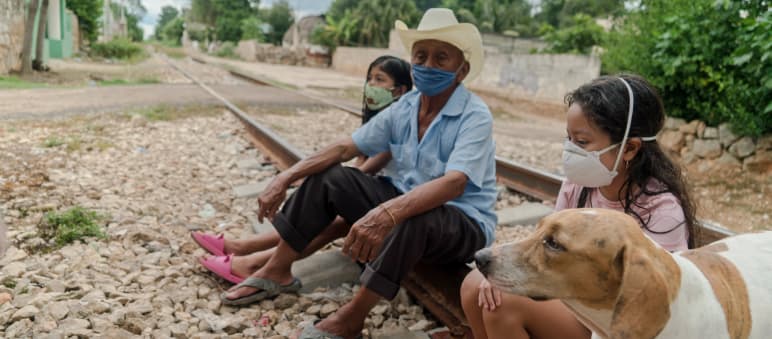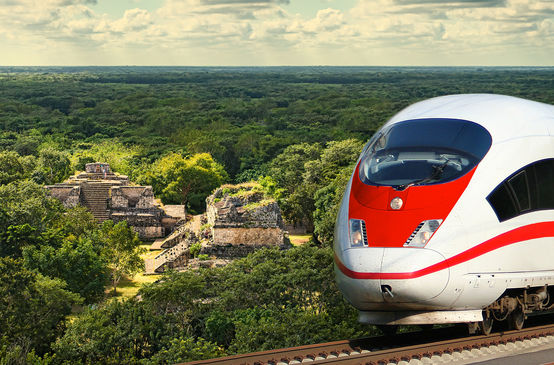
Human rights violations and judicial stalling in the Mayan Train lawsuits
: On October 20, 2021, several Mexican environmental and human rights organizations held a press conference to speak out against evident stalling in the lawsuits they filed against the Mayan Train project. Moreover, they called on the judiciary authority ensure the respect of human rights and to take prompt, firm action.
The "Mayan Train" has been frequently described as a vanity project of Mexican President Andrés Manuel López Obrador. The planned high-speed train is intended to ferry tourists from beach resorts on the Caribbean coast to archaeological sites inland. The 1,525-kilometer train route – roughly the distance from Portland, Oregon to Los Angeles, or from Paris to Rome – will cut a swathe through forest areas in five Mexican states.
On Wednesday October 20, 2021, several Mexican NGOs held a press conference to speak out against evident foot-dragging they described as “legal delay tactics” in the lawsuits they filed against the Tren Maya project.
Representatives of the organizations Indignación A.C., Kanan Derechos Humanos A.C., Centro Mexicano de Derecho Ambiental, A.C., Centro Mexicano de Derecho Ambiental, A.C. (CEMDA) and the Regional Indigenous and Popular Council of Xpujil (Cripx), together with the lawyer and activist Kalycho Escoffié – who have accompanied the plaintiffs in the judicial processes against the Mayan Train project – asserted that constitutional appeals (amparo), which were filed 15 months ago to prevent further progress of the Tren Maya project, had been stalled deliberately.
The NGOs argued that many communities, peoples and collective groups are being denied the possibility of exercising their right to justice, and for this reason “the so-called 'Tren Maya' project is contrary to human rights”.
At the same time, they pointed out that they had obtained satellite images of various sections of the Mayan Train – municipalities of Yucatan, Campeche and Quintana Roo. When compared with satellite images from a year before, they showed signs of changing usage patterns on forest lands over some 144 hectares (356 acres) of Mayan jungle. This evidence, according to the NGOs, represents "a direct violation of the right to a healthy environment because, in the absence of studies and authorizations that justify the viability of clearing forest land, there are environmental risks and damages that violate our fundamental right to a healthy environment, especially when these ecosystems provide us with environmental services."
In addition, they highlighted that the National Fund for Tourism Development (Fonatur) is committing "a violation of the suspensions that the District Courts and Collegiate Courts have granted in favor of the communities, collectives, and organizations, forcing the authorities to abstain from undertaking new works in relation to the Tren Maya project" by continuing to work along the entire route of the project, while engaging in activities that go beyond maintenance of the existing infrastructure.
While acknowledging that even though the route of the project has been modified in some areas – such as Campeche and Mérida – to avoid evictions, they pointed out that Mayan communities continue to suffer from forced displacements. Residents who have filed amparos have been pressured "to relinquish their land with the promise that they will be given new homes, in most cases with no guarantee or proper documentation to provide legal certainty” of such promise.
A final question remains: Where are the environmental impact assessments for the routing changes?
The full English text of the press release and list of the organzations opposing the project is available here.
And if you have not already done so, please sign our petition against the project here.

NO to tourist trains in the Mayan rainforest!
An absurd infrastructure project: A high-speed train from the Caribbean coast, through the Mexican rainforest to the ancient Mayan pyramids?

The rainforest
A green sea of ferns, mosses, vines and ancient trees. Iridescent butterflies and colorful birds. Flowers in every hue of the rainbow. The “green lung” is a natural wonder of the world. Find out more about the world’s most diverse, fascinating and threatened ecosystem.